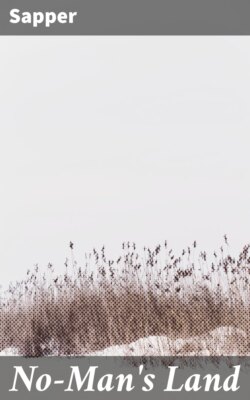Читать книгу No-Man's Land - Sapper - Страница 16
На сайте Литреса книга снята с продажи.
ОглавлениеCHAPTER XII
Table of Contents
A week later he sat in a mud bath at Havre, which went by the name of a rest camp; the Way to the Land was nearly trodden. Thousands of others had sat in that glutinous mud before him; hundreds of thousands were destined to do so after. And each and all of them were thinking men; wondering in a greater or less degree according to the size and activity of their grey matter what it was all about. To some the Unknown gave the prospect of sport, and they thanked their stars they were nearly there; to some it gave the prospect of Duty, and they trusted they would not fail. With some the fear of the future blotted out their curiosity; with others curiosity left no room for fear. But in every case they had something to think about—even if it were only the intense discomfort of their surroundings. And in every case the woman over the water had—nothing.
By cattle trucks and carriages, by so-called fast trains and unabashed troop trains they left in batches big and small; and others came and filled the gaps. The Land was calling; the Seed must not be delayed.
* * * * *
Table of Contents
"You'll have to wait till it's dark." A weary Quartermaster, wandering through Ypres, met Draycott and stopped. "Thank God! you've come. We've got three officers left and a hundred and twenty men."
"Where are they?" he demanded. "How shall I find them?"
"Very likely you won't." The other laughed mirthlessly. "I'll take you up tonight—we walk the last bit to the trenches. If a flare goes up—stand still; there's no other rule."
"You're about done in, Seymour," said Draycott, watching him keenly. "What's the trouble?"
"The trouble is Hell." The Quartermaster passed his hand wearily over his forehead. "Utter, absolute, complete—Hell. The boys have been in the front line for twenty-one days; and"—he spoke with a sudden dreadful earnestness—"the end is not far off."
"My God!" muttered Draycott, "is it as bad as that?"
* * * * *
Table of Contents
No trenches, no dug outs, no reserves. Ceaseless German attacks, rain, mud, death. And then, three or four days of icy coldness, with the bitter Arctic wind cutting the sodden, tired, breaking men like a knife. Fighting every hour, with rifles and bayonets and fists—sleepless, tired out, finished. Only a spirit which made possible the impossible supported them: only the glory of their traditions held the breaking line of Old Contemptibles to the end. And at the end—they died....
But their spirit lives on, undimmed, untarnished. It is the spirit of the New Armies—the Civilian Armies of Britain. They were training back in England when Clive Draycott went to the Land: they were learning the message of the old Regulars from New Zealand to Yukon. It is not learned in a day—that message: there is much watering and weeding to do before the seed can reach perfection, but the Land would not wait.... It was greedy then—as now; the only difference was the amount of grain available. And when Clive Draycott went to it there was very little. To God Almighty the praise. What there was, was very good.
